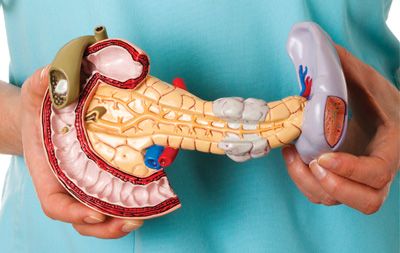Exocrine Pancreatic Insufficiency (EPI)

What Is Exocrine Pancreatic Insufficiency?
Exocrine pancreatic insufficiency (EPI) is the inability to break down and digest food properly. Normally, the pancreas produces three digestive enzymes, which move into your small intestine to help the body break down food into the nutrients you need. If you have EPI, your pancreas cannot properly break down foods, resulting in poor digestion of nutrients—especially fats.
What Are The Symptoms?
The symptoms of EPI, caused by undigested food moving through your system, can vary.
If you are experiencing any of these symptoms, talk with your gastroenterologist.
- Diarrhea
- Gas and bloating
- Stomach pain or tenderness
- Foul-smelling, greasy stools
- Weight loss
What Causes EPI?
Exocrine pancreatic insufficiency normally occurs when there has been some kind of damage to the pancreas, which reduces its ability to produce the necessary enzymes for proper digestion. Pancreatitis (inflammation of the pancreas), can lead to EPI. Pancreatitis can be caused by alcohol, immune system disorders or inherited diseases, like cystic fibrosis. Surgery of the pancreas may also cause EPI.
How Is Exocrine Pancreatic Insufficiency Diagnosed?
Your gastroenterologist may recommend several tests to help diagnose EPI. The first may be blood tests to determine vitamin and nutrient levels, to see how well your pancreas is processing foods. Additionally, your doctor may order a fecal test.
There are two main types of fecal tests. A fecal elastase test measures the amount of elastase, an enzyme produced by the pancreas, in your stool. A deficiency of elastase could be an indicator of EPI. The second is a fecal fat test, which requires eating a prescribed diet and collecting stool samples over 3 days. This test can help determine how much fat your body is not absorbing.
What Treatments Are Available?
A healthy diet, along with pancreatic enzyme replacement therapy (PERT) is the main treatment for exocrine pancreatic insufficiency. There are a number of prescription medicines that replace the enzymes your pancreas can’t make. Your doctor may also prescribe taking fat-soluble vitamins A, D, E, and K supplements to replace ones that aren’t getting absorbed from your diet.
Some patients find that eating smaller, more frequent meals, aids in the digestion and proper breakdown of nutrients. Avoid drinking alcohol, since it can damage your pancreas and make it even harder for your body to absorb fat. In some cases, patients need to take an antacid to keep the stomach from breaking down pancreatic enzymes before they can start to work.
